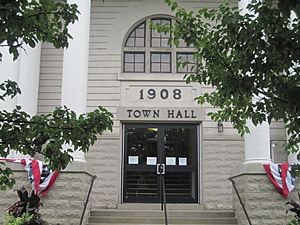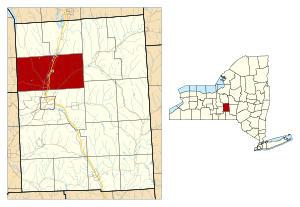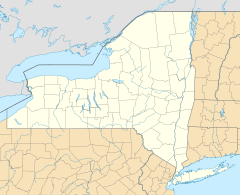Homer, New York facts for kids
Quick facts for kids
Homer, New York
|
|
|---|---|

Town Hall, Homer, NY
|
|

Location within Cortland County and New York
|
|
| Country | United States |
| State | New York |
| County | Cortland |
| Government | |
| • Type | Town Council |
| Area | |
| • Total | 50.68 sq mi (131.26 km2) |
| • Land | 50.22 sq mi (130.07 km2) |
| • Water | 0.46 sq mi (1.19 km2) |
| Elevation | 1,133 ft (345 m) |
| Population
(2020)
|
|
| • Total | 6,293 |
| • Density | 124.71/sq mi (48.15/km2) |
| Time zone | UTC-5 (Eastern (EST)) |
| • Summer (DST) | UTC-4 (EDT) |
| ZIP code |
13077
|
| FIPS code | 36-023-35287 |
Homer is a town located in Cortland County, New York, United States. In 2010, the population was 6,405 people. The town is named after the famous Greek poet, Homer.
The town of Homer includes a smaller village also called Homer. The town is on the western border of Cortland County. It is located just north of the city of Cortland.
Contents
History of Homer Town
Early Settlement and Land Grants
The area where Homer is now located was once part of the Central New York Military Tract. This was a special land area. The New York government gave land from this tract to soldiers. This was to pay them for their service in the American Revolution. The name "Homer" was given to one of these land sections by state surveyors.
Town and County Formation
People started settling in the Homer area in 1791. The Town of Homer was officially created in 1794. This happened when Onondaga County was formed. Later, in 1808, Cortland County was created from parts of Onondaga County.
In 1835, the village of Homer became its own separate area. It officially incorporated, meaning it set itself apart from the larger town.
Geography and Natural Features
Area and Location
According to the United States Census Bureau, the town of Homer covers a total area of about 50.7 square miles (131.2 square kilometers). Most of this area, about 50.2 square miles (130.0 square kilometers), is land. The remaining 0.46 square miles (1.2 square kilometers) is water.
The western border of the town is also the border of Cayuga County.
Highways and Transportation
Several major roads pass through Homer. Interstate 81, U.S. Route 11, and New York State Route 281 are highways that run north and south.
Other state routes meet in the village of Homer. These include New York State Route 41 and New York State Route 90. New York State Route 41A connects with NY-41 in the northwest part of Homer. New York State Route 13 crosses the southeast part of the town.
Rivers and Lakes
The East Branch and West Branch of the Tioughnioga River flow south through Homer. Two lakes, Lower and Upper Little York Lakes, are fed by the West Branch of the river.
Most of the town's water flows into the Susquehanna River watershed. This means the water eventually drains into the Susquehanna River. However, the westernmost part of the town drains into Fall Creek. This creek is part of the Cayuga Lake watershed, which eventually flows north to Lake Ontario.
Population and People
Population Changes Over Time
The population of Homer has changed over many years. Here's a look at how many people have lived in the town during different census years:
| Historical population | |||
|---|---|---|---|
| Census | Pop. | %± | |
| 1820 | 5,504 | — | |
| 1830 | 3,306 | −39.9% | |
| 1840 | 3,572 | 8.0% | |
| 1850 | 3,785 | 6.0% | |
| 1860 | 4,356 | 15.1% | |
| 1870 | 3,813 | −12.5% | |
| 1880 | 3,691 | −3.2% | |
| 1890 | 4,206 | 14.0% | |
| 1900 | 3,864 | −8.1% | |
| 1910 | 3,891 | 0.7% | |
| 1920 | 3,554 | −8.7% | |
| 1930 | 3,991 | 12.3% | |
| 1940 | 4,233 | 6.1% | |
| 1950 | 5,055 | 19.4% | |
| 1960 | 5,751 | 13.8% | |
| 1970 | 6,480 | 12.7% | |
| 1980 | 6,599 | 1.8% | |
| 1990 | 6,508 | −1.4% | |
| 2000 | 6,363 | −2.2% | |
| 2010 | 6,405 | 0.7% | |
| 2020 | 6,293 | −1.7% | |
| U.S. Decennial Census | |||
Demographics in 2000
In the year 2000, there were 6,363 people living in the town. These people lived in 2,446 households, with 1,746 being families. The average number of people in a household was about 2.57.
Most of the people in Homer were White (98.11%). A small percentage were Black or African American (0.41%), Native American (0.22%), or Asian (0.27%). About 0.85% of the population was Hispanic or Latino.
The median age in the town was 38 years old. This means half the people were younger than 38 and half were older. About 26.6% of the population was under 18 years old.
Communities and Places in Homer Town
- East Homer – This is a small community (hamlet) located east of Homer village, along NY-13.
- East River – Another hamlet found southwest of East Homer.
- Homer – This is the main village within the town. It's on the southern border of the town, north of Cortland. It's located near the West Branch of the Tioughnioga River.
- Little York – A hamlet situated north of Pratt Corner on NY-281.
- Pratt Corners – This hamlet is north of Homer village, also on NY-281.
Notable People from Homer
Many interesting people have connections to Homer, New York. Here are a few:
- Isaac Atwater – A jurist, which means someone who studies or practices law.
- Amelia Bloomer – A newspaper editor and a strong supporter of women's rights and temperance (avoiding alcohol).
- Francis Bicknell Carpenter – A well-known painter.
- Patrick Conway – A famous bandleader.
- Dale Dorman – A popular disc jockey (DJ).
- Albert Keep – An important railroad official and financier.
- Andrew Dickson White – He helped start Cornell University and was a U.S. ambassador.
See also
 In Spanish: Homer (Nueva York) para niños
In Spanish: Homer (Nueva York) para niños
 | James Van Der Zee |
 | Alma Thomas |
 | Ellis Wilson |
 | Margaret Taylor-Burroughs |



